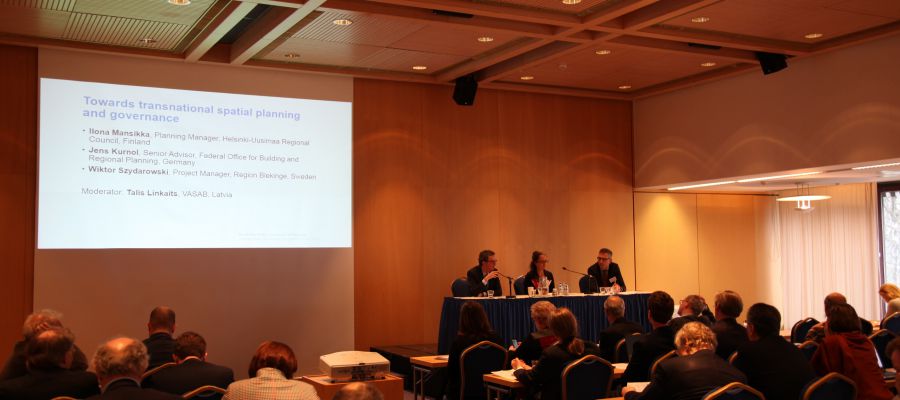
Published 7 Apr, 2016
TENTacle, NSB CoRe and Scandria2Act Kick-Off Conference in Helsinki
Three EU projects NSB CoRe, Scandria 2Act and TENTacle start their cooperation in order to develop the EU TEN-T Core Network Corridors intersecting the Baltic Sea Region. They aim to work on suitable recommendations for the decision making in the transport policy for the entire region. Safe and uncongested transportation, the possibility of smooth travelling and the reduction of emissions are goals shared by every project involved. The kick-off conference for these three projects on April 7th at Kalastajatorppa in Helsinki is a gathering for about one hundred participants.
Development goals are the North Sea-Baltic corridor going from the North Sea to Helsinki, via Poland and the Baltic, and the part of the Scandinavian-Mediterranean corridor that is going to the Baltic Sea Region, as well as the peripheral areas not connected by the Core Network Corridors in the Baltic Sea Region. These three-year projects NSB CoRe, Scandria2Act and TENTacle have all ensured their financing, as they have been approved by the Interreg Baltic Sea Region Programme. Nine core corridors form the European TEN-T core network.
Developing NSB corridor with focus on traffic and land use
The project North Sea Baltic Connector of Regions, NSB CoRe is led by the Helsinki-Uusimaa Regional Council from Finland, and it focuses on the development issues of transports and land use regarding the North Sea-Baltic corridor. Project activities are carried out with the themes of intermodal logistics and long distance commuter services. In policymaking the project aims to achieve a shared transnational vision in spatial planning in regard to transports. The branding of the Rail Baltica connection is also on the list of activities.
– Our aim is first and foremost to create a well-functioning entity of cities from Hamburg to Helsinki, where all the decision makers in transport policy and regional planning share the same goals. It is important, especially in the beginning of the project, to bring along an interregional discussion about the challenges and goals of the transport policy wished for, Mr Sakari Saarinen, the Project Manager at the Helsinki-Uusimaa Regional Council states.
The project involves sixteen partners from Finland, Estonia, Latvia, Lithuania, Poland and Germany. 3.3 million euros is the project budget for three years, and the BSR Interreg programme financing makes up for 2.6 million euros of this sum.
Remarkable joint impact by the projects
The two other projects participating in the kick-off conference were Scandria2Act and TENTacle. The Scandria2Act is a project developing the northern sections of the Core Network Corridor from Scandinavia to the Mediterranean, prioritizing energy efficient solutions in freight and passenger transports. The TENTacle project focuses on the accessibility of peripheral regions in Baltic Sea Region by developing their connections to the Core Network Corridors.
– I strongly believe that the impact of these three projects cooperating in bringing forth regional aspects for the EU transport policy in the Baltic Sea Region, is of great value. I feel pleased about this joint kick-off conference and I expect a fluent start in the mutual work, Mr Saarinen says.
Mr Horst Sauer, representing the Scandria2Act, also believes in the possibilities of a fruitful cooperation.
– Cooperation and Communication between Urban Nodes, Regions, Member States and the EU regarding the implementation of the EU policy, are key issues for being successful. The multilevel governance structures have to be improved. Scandria2Act is going to work on solutions to manage this in an effective way, Mr Sauer assures.
Mr Mathias Roos of the TENTacle project feels that a shared view upon the transport policy in the Baltic Sea Region is the key to make the area successful.
– We need to improve the understanding of core network corridor impacts among the public and market decision makers in the Baltic Sea Region, including implications for the national and regional planning. It is evident that good transport connections and effective logistics services are a pre-requisite for a competitive Baltic Sea Region, Mr Roos points out.
For more information about the conference and NSB CoRe, please contact:
Mr Sakari Saarinen, Project Manager at the Helsinki-Uusimaa Regional Council,
phone +358 50 637 5934